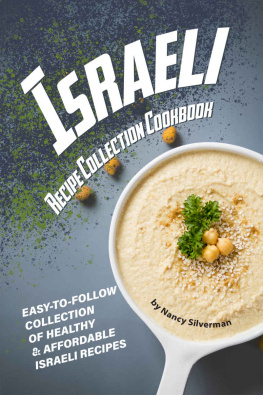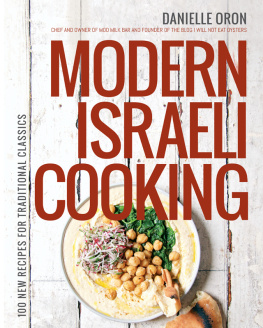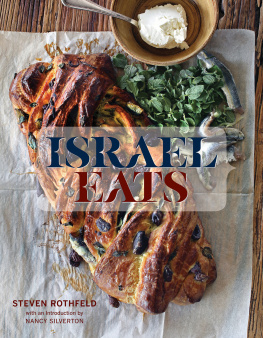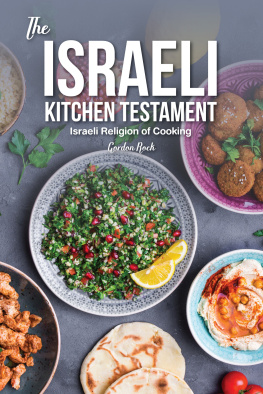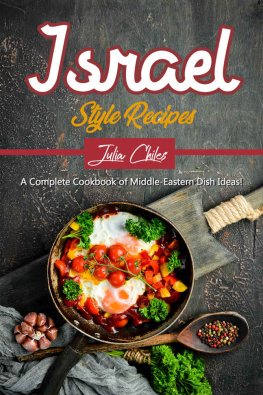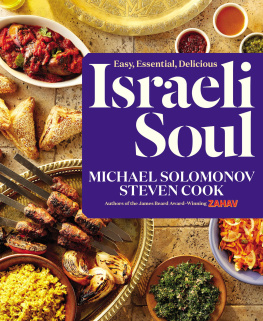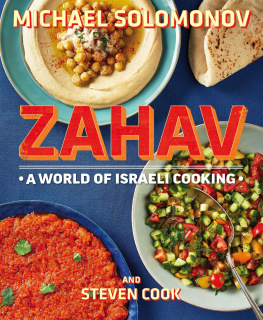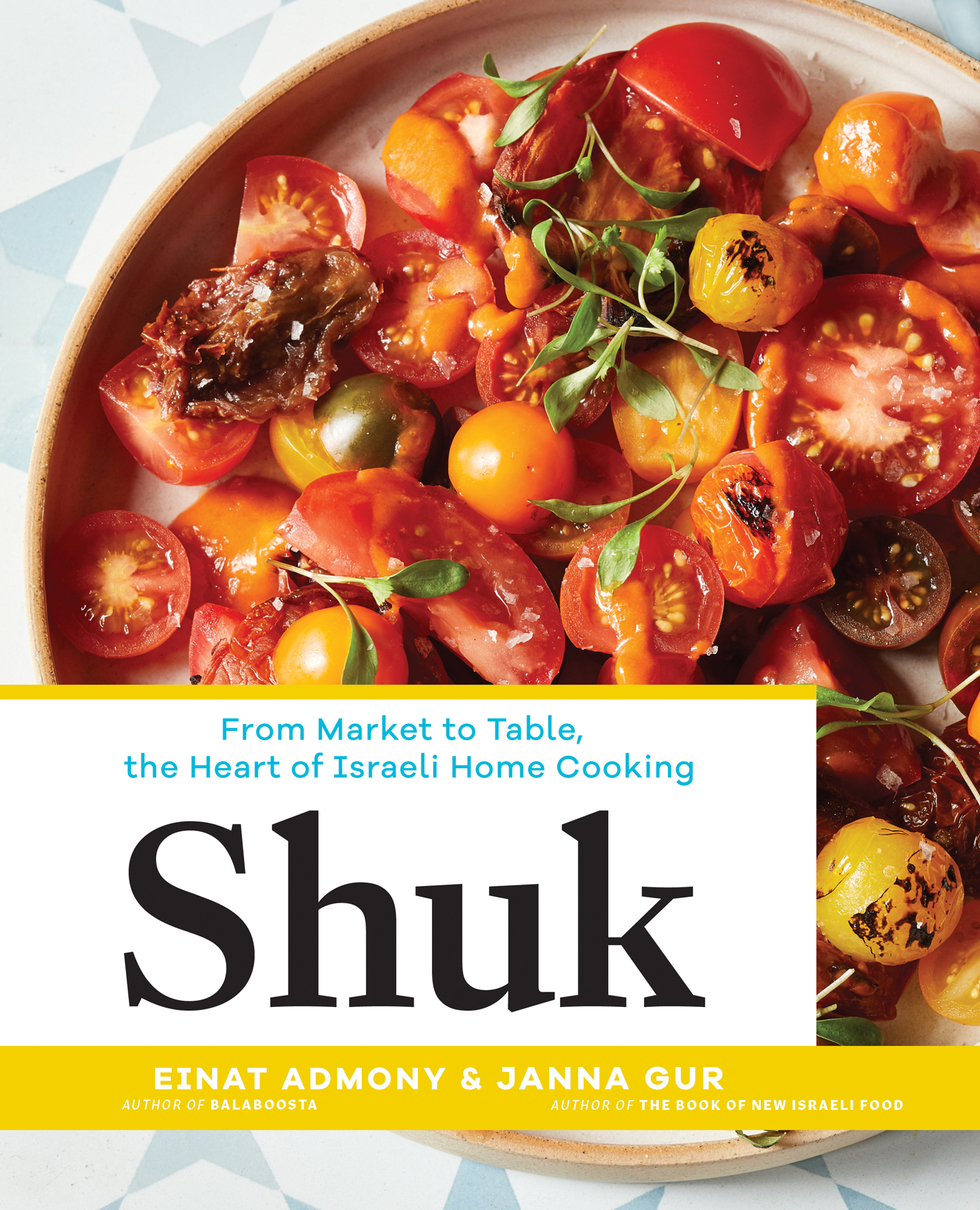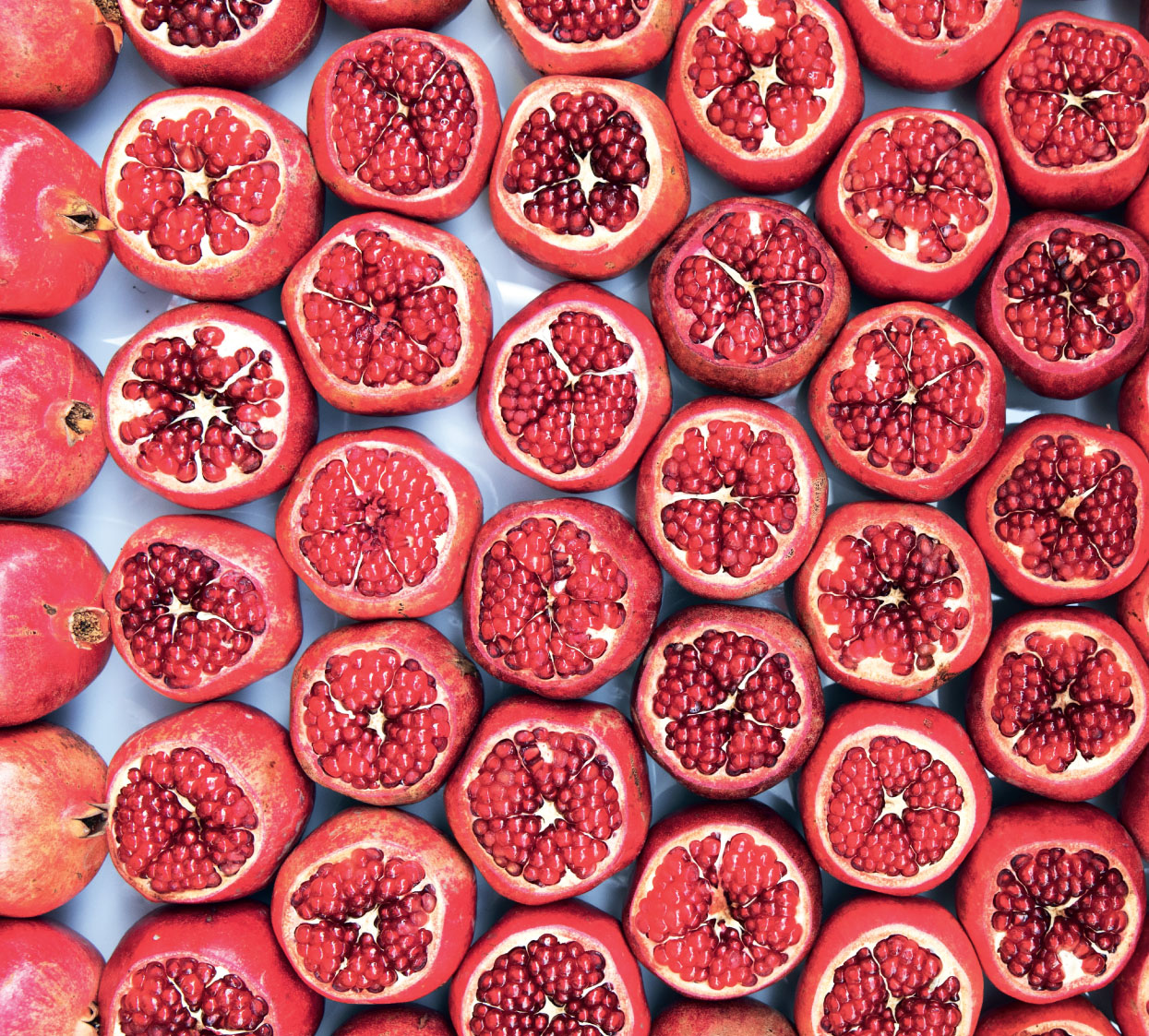
Shuk
From Market to Table, the Heart of Israeli Home Cooking
Einat Admony & janna gur
photographs by quentin bacon

artisan | new YOrk

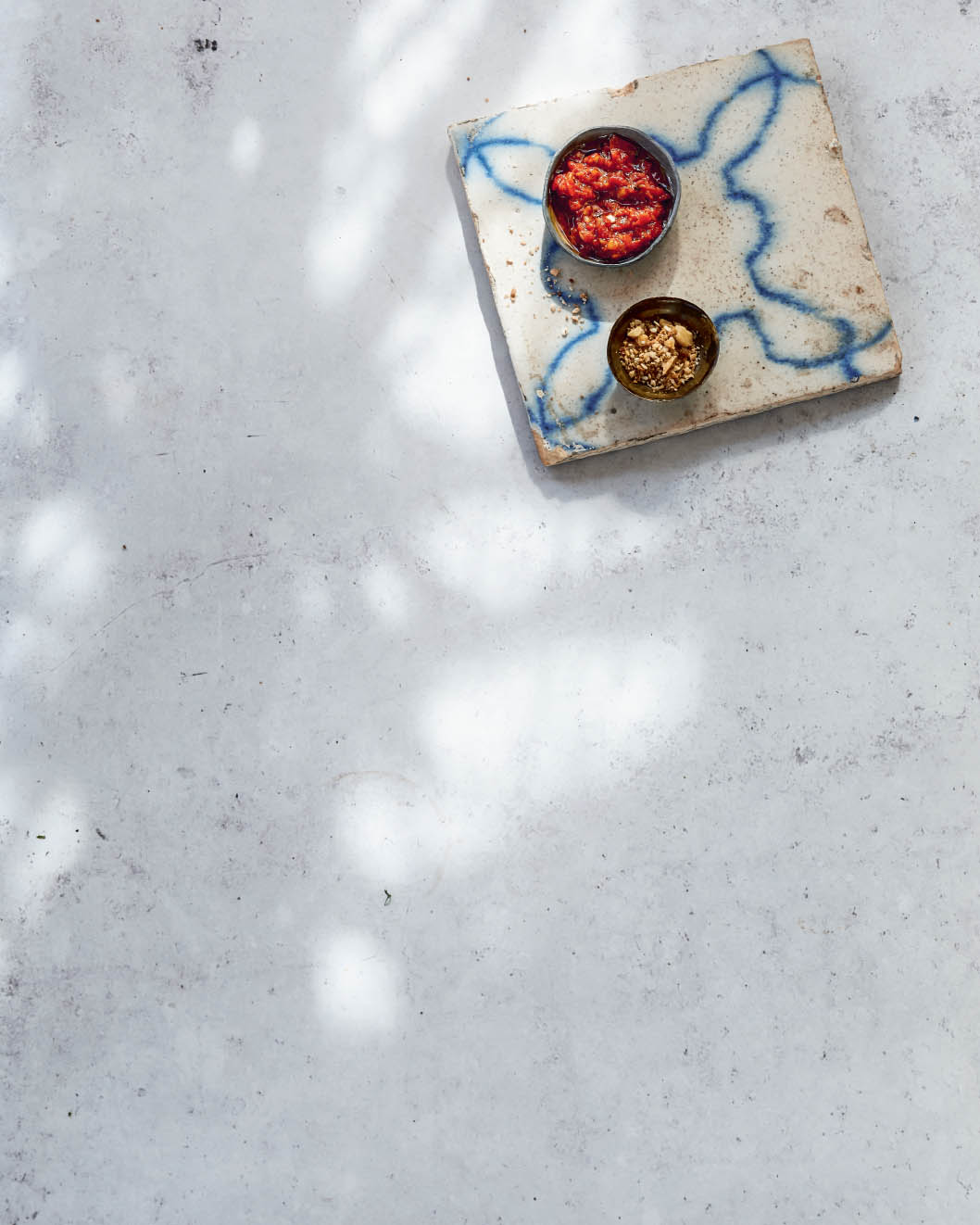
To my parents, whose cultures informed all of my cooking
E. A.
To my children, Amit and Noa, my best creation
J. G.
Contents
The Spirit of Shuk / Einat Admony
A Short Story of Israeli Food / Janna Gur
Chapter 1
Bringing the Shuk to Your Kitchen
Chapter 2
Salad All Day
Chapter 3
Cauliflower and Eggplant: Our Vegetable Heroes
Chapter 4
Tahini and Chickpeas: Our National Obsession
Chapter 5
Dairy and Eggs, for Breakfast and for Dinner
Chapter 6
Mad About Chicken
Chapter 7
All About the Rice
Chapter 8
Ktzitzot: Patties, Latkes, and Meatballs
Chapter 9
Soups to Comfort and Refresh
Chapter 10
Deliciously Stuffed
Chapter 11
The Couscous Table
Chapter 12
The Flavor of Fire
Chapter 13
Flatbreads, Traditional Breads, and Savory Pies
Chapter 14
Sweet Endings
the shuks
Shuk Levinsky / Levinsky Market
Shuk HaCarme l / The Carmel Market
Shuk HaTikva / HaTikva Market
Shuk HaNamal / Tel Aviv Port Farmers Market
Shuk Mahane Yehuda / Mahane Yehuda Market
Shuk Hair Haatika / The Old City Bazaar
Shuk Wadi Nisnas / Wadi Nisnas Market
Shuk Akko / Old Akko Market
thanks
Index

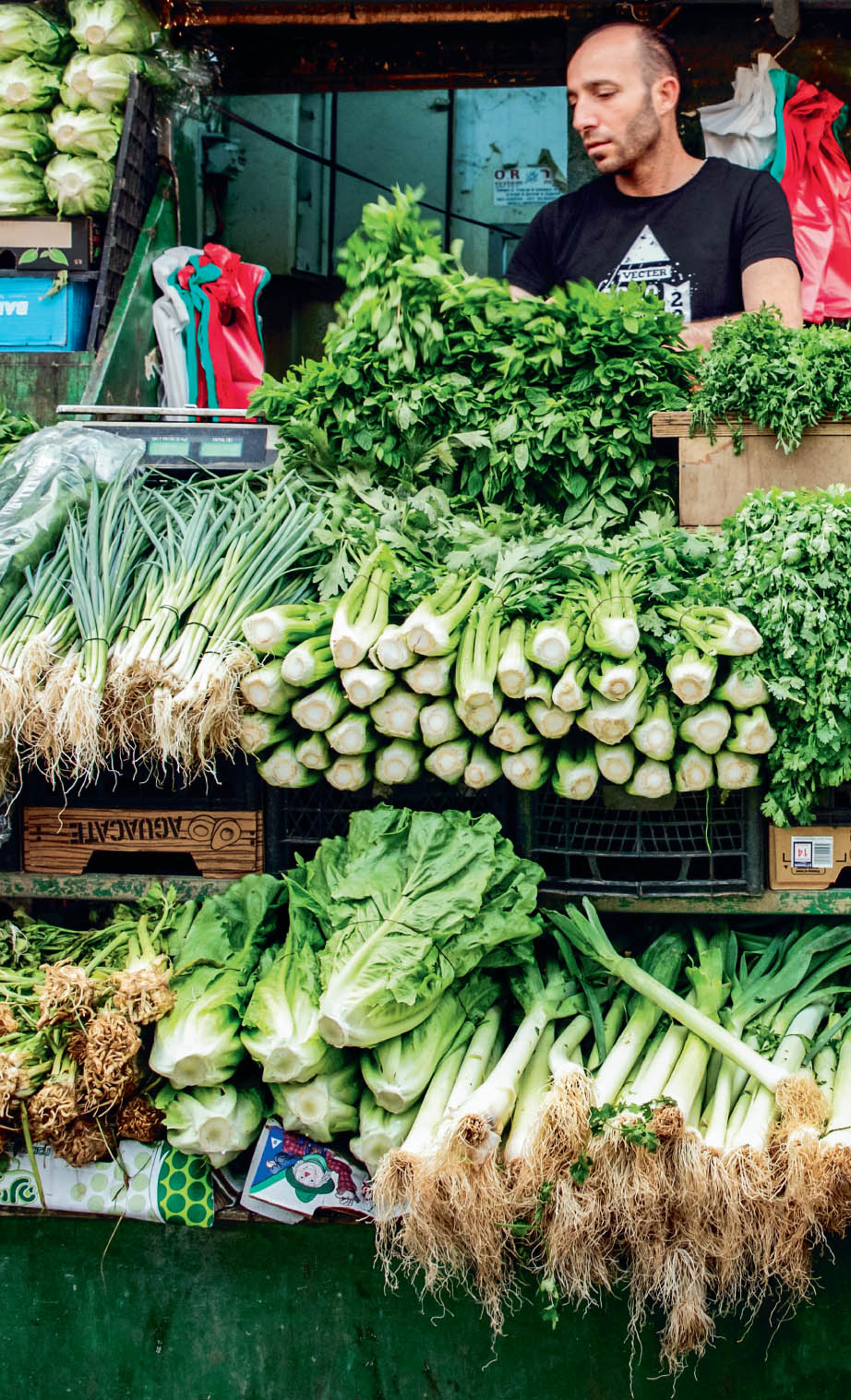
Shuk (noun) 1. An open-air marketplace. 2. A lively maze of stalls and stands selling all manner of vegetables and fruits, spices, meats and fish, breads and baked goods, olives and pickles, cheeses and yogurts, dried fruit and nuts, and vibrant herbs by the handful, plus cafs, restaurants, and food vendors serving the best hummus, flaky bourekas, meat-stuffed pitas, Iraqi kubbeh soup, and fresh-squeezed pomegranate juice. 3. The bustling heart of Israels towns and cities, each shuk a crossroads where Israelis of myriad descent (Persian, Yemenite, Moroccan, Iraqi, Tunisian, Lebanese, Syrian, Russian, and more) as well as Palestinians jostle alongside tourists, pilgrims, students, the religious and the secular, retirees and children, in their quest for nourishment, community, and the foods of their childhood.
The Spirit of Shuk
einat admony
When I was growing up, my dad was the one who shopped at the shuk, not my mother, as you might think. He was the unusual husband who was happy to take his wifes shopping list and then head out to pick up the days groceries: glossy baladi eggplant, fragrant bunches of cilantro and parsley, dates, creamy gvina levana, and perhaps more freshly toasted and ground baharat spice mix, which seemed to make its way into so many of my moms recipes.
I would often go with my father when he shopped. Shuk HaCarmel in Tel Aviv (page 80) was not far from our home in the suburbs and was also right near the Yemenite quarter in which my dad spent his childhood. We would do the shopping and then wander into the shuks Yemenite quarter, which housed a handful of simple restaurants serving Yemenite classics, the kind of food youd otherwise find only in a familys home.
My dad was happy to take on the shopping because he knew hed be rewarded by my mothers fantastic cooking (plus he was a nice guy). But he also might have volunteered for the shuk because he could indulge in some of the food he loved bestespecially lachuch, a springy, moist Yemenite flatbread that was the one dish from his culture that my mom never mastered; see my version on page 320.
My Persian mom was born in Iran, and was eventually raised in an Iraqi household. In Israel, our family would be called Mizrahi, meaning Jews who came from the Middle East rather than those with roots in Spain (Sephardic) or elsewhere in Europe (Ashkenazi).
Mizrahi dishes are the foods of my childhood, and I learned to make them starting at about age eleven, when I became my moms assistant. She was always cooking something intriguing and deliciousPersian rice dishes fragrant with handfuls of herbs; kubbaneh, a delicious Yemenite bread shed bake overnight for Shabbat lunch; chicken in fassenjan, a sauce made from ground walnuts and pomegranate juice and flavored with crazy-looking dried Persian limes. Our next-door neighbor was Moroccan, and she would let me help her with the hand-rolled couscous and all the spicy, tangy accompaniments for itpumpkin chirshi, pepper and tomato matboucha, sweet and savory lamb tagine.
While my mom and neighbor were getting free labor, I was getting an education, and I ended up as a professional chef (with a stop at cooking school along the way). Its those foods of my multicultural childhood that I crave the most and that I now cook most often here in New York City. Ive even built restaurants around my favorite Mizrahi dishes: My fast-casual Israeli chain, Tam, was one of the first in the United States to serve sabich, an Iraqi Jewish, deliciously sloppy fried eggplant sandwich... something that just a few years ago youd never have seen outside the neighborhood. (Ive turned it into a salad on page 106.) And my couscous restaurant, Kish-Kash, celebrates all the influences of North African cuisine that surrounded me throughout my childhood.
Im gratified to see that the rest of the world is catching on. So many of the wonderful dishes I grew up cooking and eating are no longer considered ochel shel bayitfood you would only eat at homebut are being featured on restaurant menus all over Israel and in the United States.
Food like this, whether Persian, Moroccan, Ethiopian, or Yemenite, represents not only my childhood and my heart but also Israeli cuisine as a wholea multicultural mosaic of traditions from literally all over the globe, served in the spirit of generosity, hospitality, and joy, evolving as Israel grows as a nation. Israeli cuisine is young but with ancient roots, and Im happy to be a part of its evolution. Now you can cook these dishes, too, and join me as we continue to create new traditions.
A Short Story of Israeli Food
janna gur
I still remember my first visit to a shuk. A teenager, in Israel barely a month, still reeling from the merciless heat of the Israeli summer, I found myself at the Carmel Market in Tel Aviv. For someone fresh from the Nordic, polite Latvia, it was almost too much to bearthe hassle, the crowds, the smellsbut the food, oh my God! It was early August, and the shuk was an orgy of peaches and watermelons, figs and grapes, all even more fragrant because of the heat. To this day, when I go to a shuk, for the first few minutes, I abandon myself to the memories of this shockingly sensual visit.


